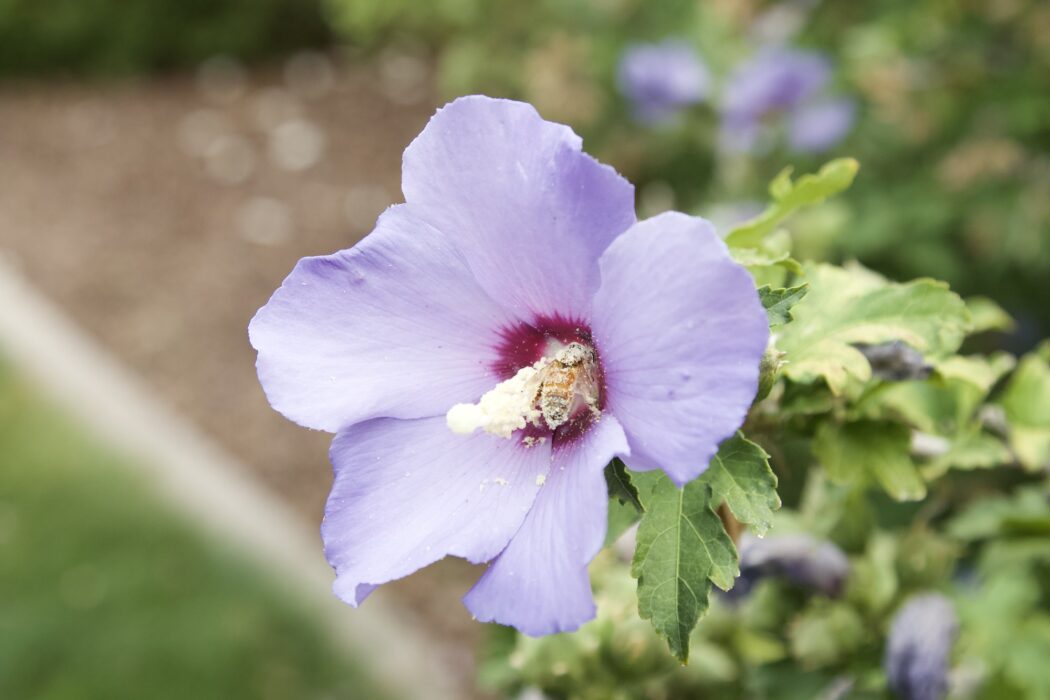Protecting pollinators throughout Utah: There is no plan bee
Vibrant campus flowers, crops Utahns depend on and the reproduction of essential plants are all reliant on pollinators such as bees, butterflies and moths. Ph.D. student Calvin Luu is working with the United States Department of Agriculture’s “bee lab” to track the fate of pesticides in solitary bee nests.
“About 85 to 90 % of the species are actually solitary bees,” Luu said. “They are usually native and wild pollinators.”
According to Luu, honeybees are often used as the baseline for research on bee species, which can be problematic because they differ from the abundant solitary bees.
Unlike honeybees, all female solitary bee species are reproductive, and they do not live in hives.
“I’m looking at the transport of pesticides in solitary bee nests,” Luu said. “Currently, a lot of EPA pesticide risk assessments for pollinators use honeybees.”
Certain pesticides pose a risk to bee populations when sprayed on fields.
“The pesticide will land on the leaves,” Luu said. “They’ll land on the soil, then the solitary bee pollinators will use leaves — they’ll use soil for nesting material.”
Unlike honeybees, solitary mothers do not care for their young. The mothers let them grow independently by leaving eggs with a bead of nectar, which Luu calls “provision.”
“A lot of these experiments are still ongoing,” Luu said. “But some preliminary data that we collected is that yes, there is a transfer of pesticides into the solitary bee larvae provision.”
According to Luu, pollinators contributed about $24 billion to the economy in 2015 and are essential to food production.
“About 120, maybe 130 different food crops in the United States require pollination by pollinators,” Luu said. “When we start having this decline in pollinators, then we’ll see a lot less food production, a lot less economic productivity from the agricultural sector.”
While pesticides are part of the issue, Luu warns against inaccurate judgments towards them.
“Pesticides can be a problem if they’re overused and used irresponsibly, but pesticides are needed for agriculture and for our economy and also food security,” Luu said. “They can be harmful, but with responsible use, they are beneficial.”
Farmers will often release their pollinators into the fields on a schedule that does not clash with the pesticide schedule.
“We set a date when we’re spraying the pesticides,” Luu said. “And we set an amount of time before we allow the solitary bees with the honeybees to go out into the field to reduce the amount of risk.”
Luu said the problem is with the native bees who are not released on a schedule and pollinate independently of human influence.
“No one’s managing them,” Luu said. “They’re going out and pollinating these crops themselves. They can be at high risk of exposure.”
Luu said that everyday people can help the bees in a very simple way.
“You can make little bee hotels in your backyard,” Luu said. “It’s a little box with straws in it, and solitary bees will go ahead and use those straws to make their nests. So, you can actually start propagating your own bees.”
Theresa Pitts-Singer, a research entomologist in the USDA Agricultural Research Service Pollinating Insects Research Unit, focuses on bee health and management.
“There was a year where they introduced a new product that’s a growth regulator,” Pitts-Singer said. “An insect eats it or is exposed to it somehow. It causes the bee not to advance to the next life stage.”
Pitts-Singer used the example of a caterpillar that is unable to grow into a bigger larva or an egg that cannot hatch because of this regulator.
“It just prevents that next molt,” Pitts-Singer said. “But a growth regulator doesn’t harm adults. So, if you spray it when the bees are present, you’re not going to kill your bees, but you will kill the little bugs that are growing and feeding on the seeds.”
Pitts-Singer is interested in finding out if the pesticides moving through plant matter used in egg cavities will kill the egg.
“If the leaf pieces they use to build that little cell have pesticides on it, does it move into the nectar and pollen — can it kill it that way?” Pitts-Singer said.
To help with the issue, Pitts-Singer advised that people become more educated about agriculture.
“I think that if we were more tolerant of imperfect food, it would be nice. And understanding that farming isn’t simple,” Pitts-Singer said. “The general public just — if they make themselves aware of where their food comes from, and appreciate it more, then I think that it would help.”

